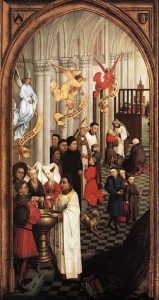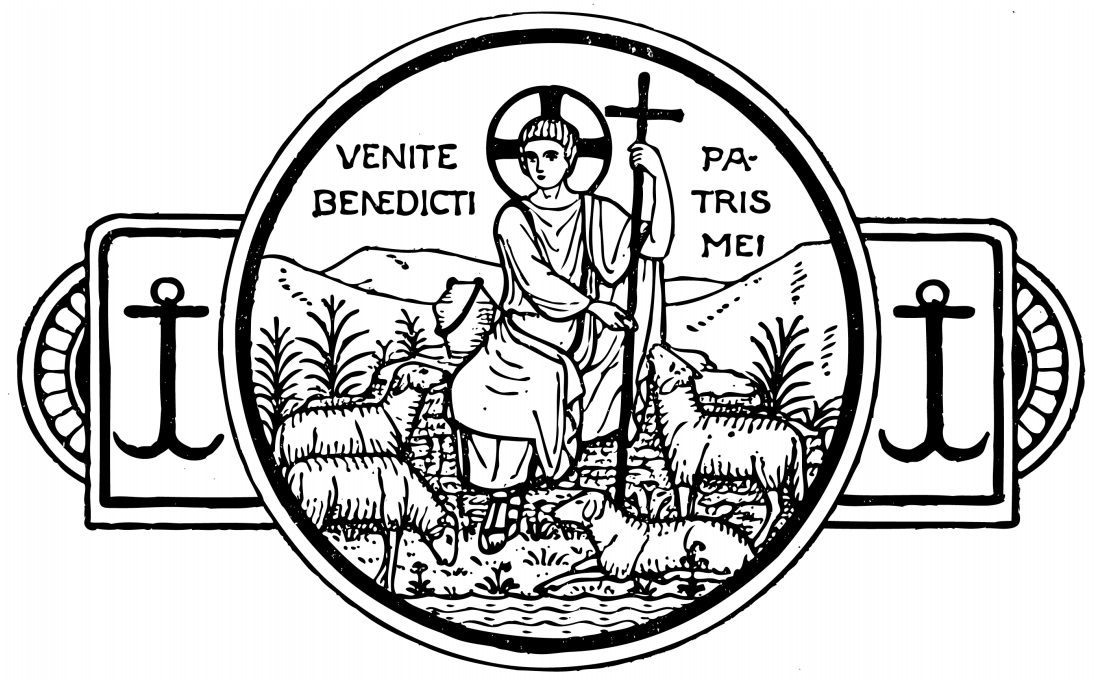A Royal Priesthood
5th Sunday of Easter (A)
click here for readings
Let’s think for a moment about what it means to be a priest. In the Old Testament, priests had a particular duty. They offered sacrifices to God, on behalf of themselves and of the Jewish people. They were the only ones who could enter the Temple. And only the High Priest could enter into the Holy of Holies (called the tabernacle in Hebrew) where the presence of God dwelt.
St. Peter teaches that God has made us into “a holy priesthood to offer spiritual sacrifices acceptable to God through Jesus Christ.” What does Peter mean by “spiritual sacrifices?” Under the old covenant, priests would offer animal sacrifices as a gesture of atonement for sin; an offering back to God of the good things of His creation. But these sacrifices were not sufficient. How could the finite offering of a mere goat or a lamb suffice for the innumerable sins of man?
This is why our loving God became Incarnate. He entered into His own creation as a Man who could be for us both priest and victim. Only God could bear the weight of all our sins. Only man could die on the cross. In Jesus we have both. In Jesus we have an everlasting and infinitely effective sacrifice. In Jesus the old priesthood comes to an end. We now have a new High Priest, whose single sacrifice is enough to save us all.
So when the Church speaks of the priesthood of the baptized she does not mean that we are priests in addition to Christ, but that we share in Christ’s one priesthood. This priesthood is rooted in our baptism, because through our baptism we are reborn in Christ. We became part of the Body of Christ. And as members of Christ’s Body, we are members of His priesthood, as well.
As priests, we can offer sacrifices. But we do not offer sacrifices of cattle or sheep. Instead we offer the sacrifice of ourselves, which is what Christ did for us. We may not be called to die as martyrs (although some Christians are), but we are called to die to self each and every day, and live for Christ. Just as Christ’s suffering redeemed us, as participants in Christ’s priesthood our suffering can also be redemptive, because we no longer suffer alone. Instead we offer our suffering as a sacrifice to God in union with Christ’s suffering on the cross. We could not do this if we did not share in Jesus’ priesthood.
As priests, we can also enter into the presence of God. In the Old Testament, only priests could enter the Temple. Only the High Priest could enter into the Holy of Holies. But as New Testament priests, the Holy of Holies enters into us! We become the Temple of God! This would not be possible if we were not true priests. So the priesthood of the baptized is very important to our lives as Christians. This is why baptism is received before any of the other sacraments. Baptism is the first sacrament of initiation which leads to the final sacrament of initiation, the Eucharist, when we receive God Himself into our bodies. We become Temples of the Holy Spirit.
So let us not devalue the priesthood of the baptized. But where does this leave the ordained priesthood? This is also something vital to our Christian faith, which cannot be ignored. The Catechism teaches us that the common priesthood and the ordained priesthood are ordered toward one another. The priesthood of the faithful is exercised by living out one’s baptismal graces in a life of faith, hope and charity; the ministerial priesthood is there to help the faithful do that. In other words, “the ministerial priesthood is at the service of the common priesthood” (CCC 1547).
We see this dynamic already in the New Testament. Jesus had many disciples, but He selected twelve men to whom He imparted certain responsibilities, and the authority to carry out those responsibilities. They could bind and loose in His name. They could forgive sins. They could offer the bread and wine that would become His Body and Blood. They do all of this at the service of the Church.
The ministry of the Apostles is the ministry of Christ carried forward in time, and out into the world. It is through the Apostles and their ordained ministry that Christ’s sacramental graces continue to flow. This is why the graces Jesus gave to the Apostles could not remain just with them, but must be transmitted to others selected to serve the Church.
We also see this happening already in the New Testament. In the Acts of the Apostles we read of the Twelve choosing many others to share in their responsibility and authority. This Sunday’s first reading is Acts 6:1-7, where the Apostles choose “seven reputable men” whom they prayed over and laid hands on (an act of ordination), to give them a share in their ministry. These sacred ministers helped in the distribution of the Church’s charity, preached the gospel, baptized new believers, and instructed the faithful.
These men are considered the first deacons of the Church. The word deacon means “servant,” and is the first degree of holy orders. Still today, before any man is ordained a priest, he is first ordained a deacon, underscoring the fact that the ministerial priesthood is at the service of the common priesthood of the faithful.
If the purpose of the ministerial priesthood is to serve the laity by helping them grow in holiness, then the purpose of the baptismal priesthood is to serve the world, by helping it to grow in holiness. For it is the lay faithful who are out in the world, and who are meant to act as leaven. The laity are the primary evangelizers who are meant to spread the faith and add to the number of the Church . The clergy exist to give the laity the spiritual tools needed to accomplish that task.
In the end we all have one goal: union with God the Father through Jesus Christ. Jesus says in this Sunday’s gospel that He is in the Father and the Father is in Him (Jn 14:11). Our baptism makes us one with Christ, and so one with the Father, in the unity of the Holy Spirit. We are a chosen race, a royal priesthood, and a holy nation. Let us never forget how precious a gift this royal priesthood is. Let us never neglect to carry out our priestly duties, offering ourselves as living sacrifices to God, offering Him praise, and carrying the message of Christ’s mercy out into the world.



